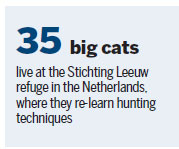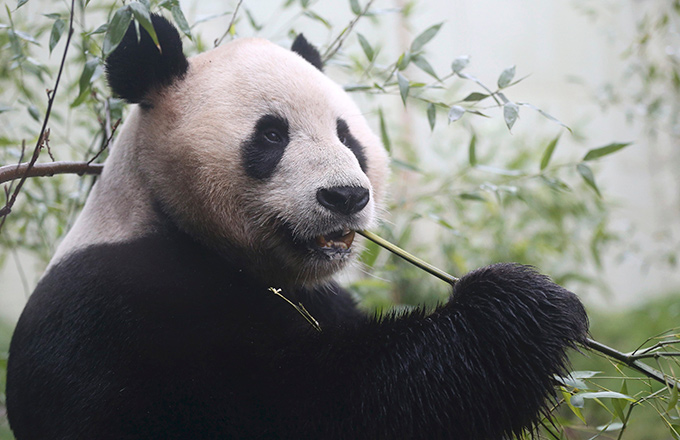Classes give big cats taste of the wild life
ANNA PAULOWNA, Netherlands - Suspended from a large butcher's hook, a prime piece of raw steak glides and then zigzags through the air in a big arena under the watchful eye of Dumi, the lioness.
With her hunter's instinct taking over, the big cat runs down her "prey" across the rocks and ponds of an artificial savanna at a lion sanctuary north of Amsterdam, then hooks her claws into her quarry after a spectacular leap.
Perhaps one day, thanks to this unique hunting simulator manipulated by a joystick, former circus performer Dumi will be able to hunt in Africa.
"It's a system which is meant to train the animals and not only give them back a little of their instinct, but also improve their motor control, their muscles, strength and reactions," said Daphne Pels, a keeper at the Stichting Leeuw (Lion Foundation) refuge.
There are 35 wildcats at the sanctuary in the small town of Anna Paulowna, some 80 kilometers north of Amsterdam.
Most have been born in captivity, and the foundation aims to get the big felines - lions, tigers, cougars and leopards - back into peak condition to improve their lives and ultimately, even to hunt in the wild.

The cats were mostly rescued from inexperienced and sometimes malicious private owners.
Some are survivors of circuses that used wild animal acts - now partially or totally banned in some EU countries - and find it too expensive to feed the rapacious carnivores that can devour up to 6 kilograms of meat a day.
Like Omar. Used as a cub by a circus to attract tourists who could hug the baby lion for selfies, Omar was eventually sold to a Slovakian mafia boss, who kept him in his garden as a pet.
When the foundation rescued Omar in March 2015, the male lion suffered from advanced malnutrition and was basically just skin and bones, with no muscle, and covered in sores and feces.
It took Omar two years to recover. He now sports a large fawn-colored mane, but he bears a scar on his muzzle and his small, amber eyes remain vigilant and mistrustful.
"These are animals that depend on humans a lot because they were bottle-fed, born in the circus and declawed" by their tamers or owners, said Pels.
"We can't just put them back in the wild," she said.
Now Sarabi, the lioness, and Ambra and Laxmi, two tigresses, regularly train in this "playground" of roughly 80 meters by 50 meters, which took three years to build.
Prey can vary: sometimes it's a toy, sometimes a piece of meat and even, when there's no audience, a dead rabbit or pigeon to help rekindle their hunting instincts.
Established in 2011 by a passionate businessman and financed through private donations, the foundation hopes to relocate Omar back to Africa this year "to give him a family". Now aged 5, Omar will join five other lions already living in the Bahati wildlife estate in northern South Africa. Two Bengal tigers are also expected to join the Wildlife Friends Foundation of Thailand.
Agence France-presse
(China Daily 09/07/2017 page10)




























